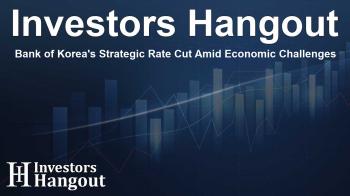Bank of Korea's Strategic Rate Cut Amid Economic Challenges

Understanding the Recent Bank of Korea Rate Cut
The Bank of Korea is poised to implement a 25 basis points reduction in its base rate on an upcoming Thursday. This decision, expected ahead of the previously anticipated timing, aims to bolster a financially struggling South Korean economy buffeted by political instability. A poll conducted among economists by Reuters reveals a consensus leaning towards this adjustment, showcasing 80% of participants anticipating a shift from the current rate of 3.00% down to 2.75%. This significant move comes as South Korea grapples with immense public dissatisfaction linked to the current political climate.
Political Unrest and Economic Implications
Acting President Choi Sang-mok faces a tumultuous environment in Asia's fourth-largest economy, which is currently experiencing unrest due to the government’s attempts to manage the impeachment of President Yoon Suk Yeol. This uncertainty has led to a significantly revised growth outlook for 2025, decreasing from 2.2% to a more conservative 1.8%. As numerous economists have pointed out, this volatile political landscape, combined with escalating domestic household debt, places immense pressure on the Bank of Korea to act decisively.
The Challenge of Currency Stability
The South Korean won has plunged to its weakest point in nearly 15 years, prompting alarm within financial markets. The potential for further threats, including tariffs from the incoming U.S. administration, complicates forecasts surrounding U.S. interest rate adjustments. Such international tensions could further deter the Bank of Korea from implementing aggressive monetary easing strategies, thereby affecting South Korea’s export-driven economy.
Economic Projections and Expert Opinions
Polling data indicates that among 34 economists surveyed, 27 anticipate that the Bank of Korea will proceed with a quarter-point rate cut by January 16. Yet, this view is contrasted by another group of economists predicting that the bank may choose to maintain its existing rates, reflecting the divided nature of opinion surrounding economic prospects in the nation. A prior poll indicated many believed that subsequent cuts might occur as early as February, showcasing a sustained expectation for monetary policy adjustments in light of ongoing economic pressures.
Expert Forecasts
Various economists have expressed that the Bank of Korea may continue to lower its policy rates to reach what they deem a neutral stance, with projections seeing rates potentially drop to around 2.25% within the first half of the year. This sentiment reflects ongoing uncertainties regarding global monetary policies, particularly as the U.S. Federal Reserve's trajectory may significantly influence the Bank of Korea's own decisions. Jin Choi, a Korea economist from HSBC, highlighted the tempered domestic recovery and plummeting consumer sentiment, suggesting a further need for easing measures.
Monitoring the Future Landscape
In conclusion, the challenges faced by the Bank of Korea underline the delicate balance authorities must maintain amidst political and economic shifts. With substantial variances in predictions for future base rates ranging from 2.00% to 2.50%, the path forward remains shaped by a complex interplay of domestic policies and external influences. Despite the uncertain outlook, signs of future cuts may be influenced by ongoing demand recovery patterns and the stability of household finances. As attitudes towards consumer spending evolve, the Bank of Korea remains on the precipice of pivotal financial decisions. All eyes will be on how these dynamics unfold as stakeholders anticipate its next strategic steps.
Frequently Asked Questions
What is the current base rate of the Bank of Korea?
The current base rate of the Bank of Korea is 3.00%.
Why is the Bank of Korea considering a rate cut?
The Bank of Korea is considering a rate cut to support the struggling South Korean economy amid political uncertainty and high household debt.
What impact does political turmoil have on the South Korean economy?
Political turmoil impacts the South Korean economy by creating uncertainty, which affects growth projections and consumer confidence.
How have economists reacted to the potential rate cut?
Many economists support the potential rate cut, citing the need for a more accommodative monetary policy amidst rising economic challenges.
What are the expectations for future interest rates?
Expectations for future interest rates vary, with some economists predicting a drop to 2.25% while others suggest it could remain at 2.50% or even fall to 2.00%.
About Investors Hangout
Investors Hangout is a leading online stock forum for financial discussion and learning, offering a wide range of free tools and resources. It draws in traders of all levels, who exchange market knowledge, investigate trading tactics, and keep an eye on industry developments in real time. Featuring financial articles, stock message boards, quotes, charts, company profiles, and live news updates. Through cooperative learning and a wealth of informational resources, it helps users from novices creating their first portfolios to experts honing their techniques. Join Investors Hangout today: https://investorshangout.com/
Disclaimer: The content of this article is solely for general informational purposes only; it does not represent legal, financial, or investment advice. Investors Hangout does not offer financial advice; the author is not a licensed financial advisor. Consult a qualified advisor before making any financial or investment decisions based on this article. The author's interpretation of publicly available data shapes the opinions presented here; as a result, they should not be taken as advice to purchase, sell, or hold any securities mentioned or any other investments. The author does not guarantee the accuracy, completeness, or timeliness of any material, providing it "as is." Information and market conditions may change; past performance is not indicative of future outcomes. If any of the material offered here is inaccurate, please contact us for corrections.
